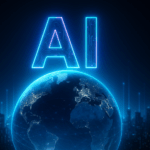Gaia Labs has announced its latest innovation, an AI-powered smartphone for users in South Korea and Hong Kong, signaling a new direction for integrating blockchain technology into everyday devices. Unlike traditional smartphones that rely on cloud services, this device will utilize on-device AI models, enhancing privacy and efficiency. By including on-chain identity support and a pre-loaded Gaia domain, the firm aims to offer users a more decentralized and secure mobile experience.
The move by Gaia Labs comes amid a wave of efforts to incorporate blockchain capabilities into consumer electronics. As far back as 2018, HTC introduced the Exodus 1, an Android device designed with blockchain integration by offering a hardware wallet and support for multiple blockchains. This device was among the earliest instances of such integration in the mobile sector. The trajectory from HTC’s early endeavor to Gaia’s current launch reflects an ongoing trend of combining AI and blockchain in consumer technology.
What Does Gaia’s AI Phone Offer?
Gaia Labs’ phone distinguishes itself by removing the dependency on cloud computing. Instead, the device will run AI models entirely on its hardware, enhancing data privacy and speed. Additionally, users can manage their digital identities and manage transactions through the on-chain identity feature. Gaia Labs also promises that additional partnerships with major Web3 and gaming projects will be disclosed in the near future.
“Additional major partnerships with leading Web3 and gaming projects will be announced in the coming weeks,” a Gaia Labs press release stated.
How Are Other Companies Integrating Blockchain into Devices?
The blockchain device market is expanding with various companies launching products. Solana Mobile recently launched the Play Solana Gen 1 console with a built-in hardware wallet, emphasizing its role in Web3 gaming. Mysten Labs, in collaboration with Playtron, has introduced SuiPlay0X1, a handheld gaming device with native Web3 features. Luxury brand Vertu also ventured into this arena with its Metavertu smartphone, integrating a dual Web2/Web3 platform.
Solana Mobile describes its portable gaming console as a portal into a tokenized gaming economy, encouraging users to earn by playing. With these developments, blockchain functions are becoming integral to gaming and communication devices, facilitating seamless transitions across digital environments.
Past reports, such as one from PYMNTS, highlight blockchain’s broad appeal, shedding light on its potential across financial ecosystems. The focus has been on transparency and efficiency, with blockchain transcending borders and finding applications in diverse industries worldwide.
The pursuit by Gaia Labs to introduce a phone operating AI without cloud dependency aligns with broader efforts to integrate advanced technologies into daily life. While the company champions decentralized models, it joins a competitive field populated by devices that converge AI, blockchain, and consumer electronics. Manufacturers continue to find new ways to blend these technologies, underscoring the growing consumer interest and the potential for blockchain to enhance digital interactions.










